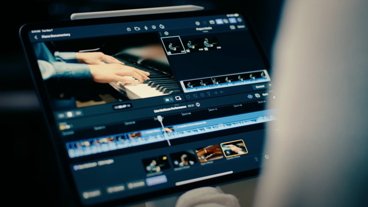Abilene Christian University has been conducting extensive studies on the effects of mobile devices on student learning for more than three years. Prior to the launch of the iPad, the university undertook an initiative to hand out iPhones and iPod touches to incoming freshmen.
The university's iPad-specific research results are "uniformly positive," as noted by TUAW after a preview of the data. One study found that "students who annotated text on their iPads scored 25% higher on questions regarding information transfer than their paper-based peers."
Researchers who tracked ACU's first all-digital class noted that the iPad promotes "learning moments" and helps students to be more efficient with their time. Graduate students in an online program responded with a 95 percent satisfaction rate to online iPad-based coursework.
Apple has seen quick educational adoption of its touchscreen tablet device. Earlier this year, Georgia legislators revealed that they were considering plans to get rid of conventional textbooks in middle school classrooms and implement iPads.
"Last week we met with Apple Computers," State Senator Tommie Williams said in February, "and they have a really promising program where they come in and their [sic] recommending to middle schools – for $500 per child per year, they will furnish every child with an iPad, wi-fi the system, provide all the books on the system, all the upgrades, all the teacher training – and the results they’re getting from these kids is phenomenal."
Schools from around the country, including New York, Illinois, Virginia and California, have begun pilot programs to bring the iPad into the classroom. Programs implementing the iPad range from middle schools and high schools all the way up to medical schools. The Chicago public school system has seen gains as much as 50 to 60 percent in reading math and science in classrooms with the iPad.
Last year, Apple introduced volume educational discounts for applications on the App Store in hopes of increasing iOS device adoption among educational institutions.
Apple recently reported that total downloads of its iTunes U initiative, which offers print, audio and video downloads of school courses and lectures, have topped 600 million.
According to UBS Investment Research analyst Maynard Um, the iPad has become a popular choice for students and faculty. His retail channel checks also indicated that non-iPad tablet sales have continued to lag.
Apple has expressed interest in new technology that would help users tailor the company's devices to accommodate unique disabilities and special needs. During the unveiling of the iPad 2 earlier this year, the company highlighted in a video the fact that the iPad has been used to assist children with autism and help students interact with content in a new and unique way.
 Josh Ong
Josh Ong






-m.jpg)






 Marko Zivkovic
Marko Zivkovic
 Mike Wuerthele
Mike Wuerthele
 Christine McKee
Christine McKee
 Amber Neely
Amber Neely
 Sponsored Content
Sponsored Content
 Wesley Hilliard
Wesley Hilliard

 William Gallagher
William Gallagher








67 Comments
That's pretty cool. I'd like to see more studies on the effect of the iPad on education.
Students using the Apple's iPad for their studies have been found to score higher than their paper-based peers and enjoy higher efficiency, according to a new study ...
Correlation is not causation.
Correlation is not causation.
Exactly.
More like rich students have more resources and time for their studies than poor students struggling to pay tuition.
Exactly.
More like rich students have more resources and time for their studies than poor students struggling to pay tuition.
thank you for saving me from writing that out.
Correlation is not causation.
Exactly, no mention of sample sizes I can see, or any socio economic factors which could also influence the result? For instance, do only high IQ students have the iPads? The sound bite is not enough to suggest the iPad as the cause, as you point out.